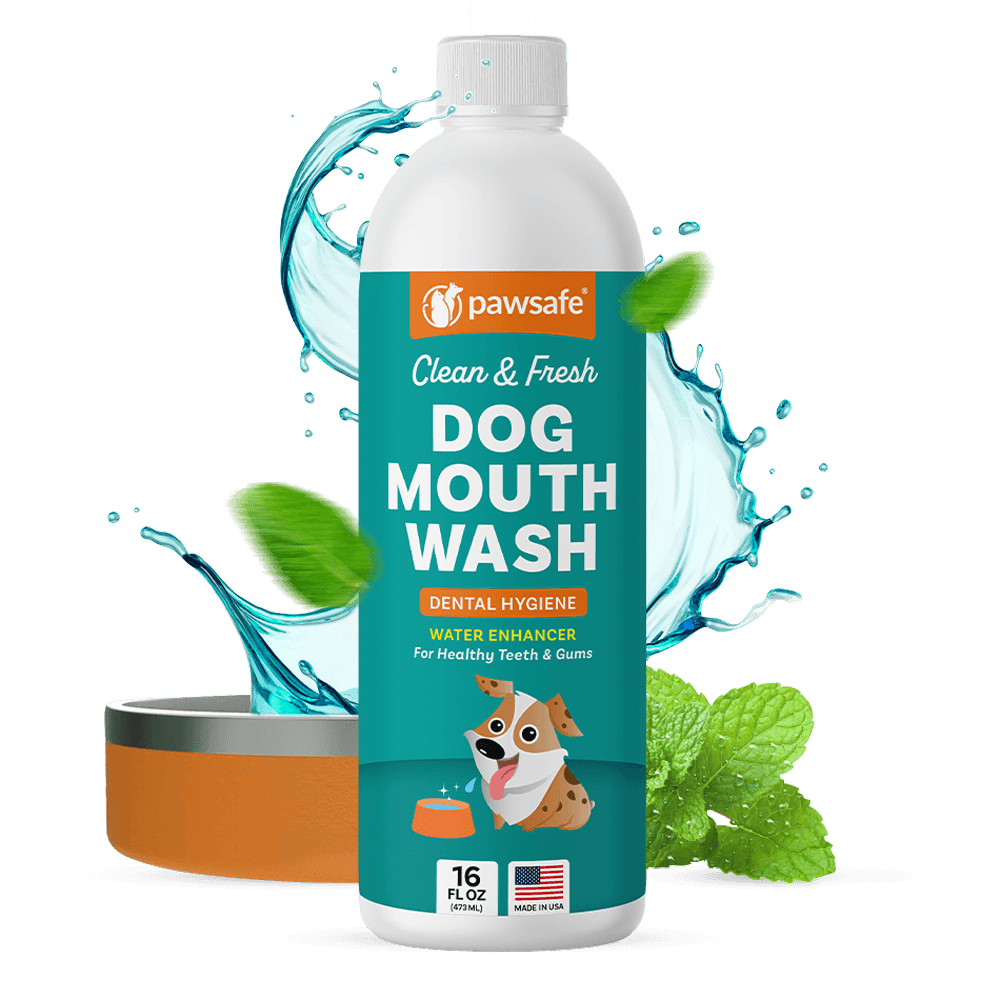
Have you ever asked why your dog chatters his teeth when excited? At first, it might seem odd, but it’s quite common among certain dogs. You can see the teeth chattering even when it’s not cold, meaning temperature regulation isn’t all that’s behind the behavior.
But before looking into excited chattering, ensure dental issues aren’t the culprit with quality dog teeth cleaning products. Some breeds are more susceptible to chattering their teeth than others, particularly the high energy dog breeds.
In this article, we will take a closer look at this phenomenon and explore the different possible reasons behind it, as well as how to manage it**. Dog Speak[1] **by Part of the Family covers this matter along with other fun topic in the article.
Table of Contents
- So, Why Is My Dog Chattering Their Teeth When Excited?
- What is Dog Teeth Chattering?
- Why Dogs Chatter Their Teeth When Excited?
- Is Teeth Chattering Harmful to Your Dog?
- How to Manage Your Dog’s Teeth Chattering
- My Dog Is Chattering His Teeth After Sniffing?
- Frequently Asked Questions
- Final Thoughts
- References
So, Why Is My Dog Chattering Their Teeth When Excited?
The most common reason for dogs chattering their teeth is over-excitement, as a bodily response to the strong emotion. It is more common in high-energy breeds like Border Collies and Malinois. Other common reasons for dogs chattering their teeth are the Flehmen response to strong tastes and smells, stress, temperature regulation, and anticipation.
What is Dog Teeth Chattering?
Teeth chattering in dogs is a rapid movement of the jaw that produces a clicking sound. The sound is often observed when a dog is excited, anticipating something enjoyable, or experiencing heightened emotion. You may also see it after they smell or taste something new with a strong scent (usually urine).
Often, a dog clattering their teeth looks like they’re shivering. However, shivering only refers to a temperature-related response, while several factors, most excitement-related, cause chattering.
Teeth chattering should also not be confused with body tremors, such as shaking back legs, which could mean anything from fear, to low blood sugar, to neurological problems. It’s also different from when dogs are nibbling with their front teeth, called cobbing or pibble nibbles.

Why Dogs Chatter Their Teeth When Excited?
When your dog gets excited, his body produces several hormones and neurotransmitters, such as dopamine and adrenaline. These chemicals trigger various physiological responses, including increased heart rate, respiration, and muscle tension.
Teeth chattering may be a manifestation of these responses, as the dog’s jaw muscles start twitching uncontrollably.
Interestingly, these same hormones and neurotransmitters are also released when dogs are afraid or anxious. In fact, a study[2] showed that abnormal endorphin levels (that normally cause euphoria) could also cause depression.
This means that teeth chattering can signify both positive and negative emotions in dogs. This applies to other behaviors like wagging, where research[3] has shown that happy dogs mostly wag their tails to the right. While wagging to the left can indicate stress and fear.
Let’s get into what exactly causes dog teeth to chatter when excited:
Over-Stimulation in Excited Dogs
One possible reason for dogs chattering teeth when excited is the overstimulation involved with the emotion. Dogs sometimes engage in displacement[4] behavior like shaking their bodies and chattering teeth if overwhelmed by a certain emotion.
Breed Susceptibility and Brain Chemistry
High-energy breeds like Belgian Malinois, Australian Cattle Dogs, and Border Collies present more excitement-related chattering than other breeds. Sources[5] on Belgian Malinois have shown that a dopamine transporter gene is associated with increased impulsiveness in Mals. This explains why Mals are known to act first and think later.
Dopamine makes dogs work harder, and high-energy working dog breeds have more of it than the mastiff or Retro Pug that prefers to sleep most of the day. Therefore, these dogs can chatter their teeth if they really want to do something or feel like it’s incomplete.
Studies[6] have also found a link between decreased serotonin and dopamine levels in ADHD-like dogs, which tend to be mostly high-energy breeds.
Anticipating Something
Your dog can chatter their teeth when they’re really looking forward to something. Even typical lower-energy dogs can chatter if they are waiting for something like a treat or a toy. This Belgian Malinois, for example, really wants her toy. It seems that the struggle to control her impulse to grab the toy and obey the command to stay causes anticipation and perhaps a degree of inner tension that leads to clattering teeth.
#### How to Identify Excitement-Related Teeth ChatteringIf you’re not sure whether your dog’s teeth chattering is related to excitement, there are a few signs you can look for. Excitement-related teeth chattering occurs when the dog is happy and relaxed, with a wagging tail, loose body posture, and an alert expression. Your dog may also jump up and down, bark, or wag his tail vigorously.
Another way to identify excitement-related teeth chattering is to observe the context in which it occurs. If your dog only chatters his teeth when he sees his favorite toy or when you are about to take him for a walk, the behavior is likely related to excitement and really wanting something.
However, if your dog chatters his teeth in different situations, it may be a sign of anxiety or stress.
The Flehmen Response And Teeth Chattering In Dogs
One other reason you may see a dog chattering their teeth is when they smell the urine or rear end of a female on heat, called the Flehmen response in dogs. This may be one of the signs a male dog wants to mate as it is a response to sensing pheromones with the vomeronasal organ in their mouth.
This teeth chattering will typically only happen after a dog is intently licking or smelling something with a strong scent, typically the urine of a female dog in heat. However, some dogs have a Flehmen response when they taste or smell something new or exciting, such as when given a new treat or cookie.

Although excitement is the most common teeth-chattering cause, other reasons can cause the response, including:

Fresh Breath The Easy Way
Just add to the water bowl to support cleaner mouths and noticeably fresher breath without daily brushing struggles.
Shop Now 👉Fresh Breath Guarantee • 90-Day PawSafe® Promise
Communication
Teeth chattering in dogs can also be a form of communication. In the wild, dogs use body language to convey their emotions and intentions to other dogs. Teeth chattering may serve as a signal of friendliness, inviting other dogs to play and interact. It can also be a way for dogs to show their excitement and eagerness to explore their environment.
Fear and Anxiety
Paying attention to other body language cues when interpreting teeth chattering in dogs is important. For example, if a dog’s body is tense and their tail is tucked between their legs, teeth chattering may indicate fear and panic attacks rather than excitement.
Dental Problems
Although less common, dental problems such as dental pain, loose teeth, or a misaligned bite could cause teeth chattering. If you suspect dental issues, it’s essential to have your dog examined by a veterinarian because dogs can suffer from common issues like cavities and periodontitis.
Neurological Disorders
If your dog’s teeth chattering is accompanied by other symptoms, such as seizures, tremors, rapid panting, excessive drooling, or loss of coordination, it may be a sign of a neurological disorder, such as epilepsy or Parkinson’s disease[8]. In some cases, it may happen when a dog has ingested a toxin that is affecting their brain chemistry.
If this is the case, your vet may recommend diagnostic tests, such as blood work or imaging, to determine the cause of the symptoms. This could be a medical emergency, so be sure to act fast if you suspect your dog is having a seizure.
Temperature Regulation
Cold weather and shivering is one reason for teeth chattering in dogs. Your dog may chatter their teeth when they’re cold or chilly.
Dogs use panting as a primary means of cooling down; similarly, teeth chattering is a response to low temperatures. However, this type of response is mostly called shivering instead of teeth chattering.
Pain
Although rare, sometimes pain causes dogs to shiver or shake, which in turn makes their teeth chatter. Conditions causing pain like arthritis, temporomandibular joint (TMJ), and occasionally GI (Gastrointestinal or stomach) upset can infrequently shiver and chatter.
Is Teeth Chattering Harmful to Your Dog?

Teeth chattering in dogs is a common behavior with various causes, varying the degree of harmfulness. It may occur when a dog is excited, anxious, cold, or experiencing a strong emotion, such as fear or anticipation.
While teeth chattering is generally harmless and doesn’t cause pain or discomfort, paying attention to your dog’s behavior and health is important to ensure their well-being.
If your dog’s teeth chattering is accompanied by other symptoms, such as drooling, bad breath, or bleeding gums, it may be a sign of dental problems, such as tartar buildup or tooth decay. If fearful signs. Other signs like collapsing, seizures, and discomfort also indicate something greater.
Additionally, providing your dog with chew toys and dental treats can help keep their teeth healthy and clean and prevent dental issues from developing in the first place.

Daily Water Additive For Oral Freshness
Helps maintain better breath and oral hygiene as your dog drinks, keeping cuddle moments pleasant.
Shop Now 👉Fresh Breath Guarantee • 90-Day PawSafe® Promise
Is It Normal For My Dog To Chatter His Teeth: When Should I Be Worried?
If your dog’s teeth chattering is persistent and doesn’t seem to be related to excitement or anxiety, it’s best to consult your veterinarian. Teeth chattering can be a symptom of various health conditions, such as epilepsy, seizures, or neurological disorders, that require prompt diagnosis and treatment.
Other signs to watch for include changes in your dog’s appetite, energy level, or behavior, as well as any unusual movements or vocalizations. Your vet may perform a physical exam, blood tests, or other diagnostic tests to determine the underlying cause of your dog’s teeth chattering and recommend appropriate treatment options.
It’s important to be aware of your dog’s behavior and health and to seek veterinary care whenever you have concerns or questions. By working together with your vet, you can help ensure your dog’s well-being and happiness for years to come.
How to Manage Your Dog’s Teeth Chattering
If your dog’s teeth chattering is causing distress or discomfort, there are several ways to manage it. These include:
Training Techniques to Reduce Teeth Chattering
Teeth chattering is typically an involuntary movement, and it’s difficult to train away something your dog is not consciously doing. Many sports like ISG, protection work, or agility, involve high-energy dogs that will chatter their teeth from excitement. I
In these cases, so long as the dog has good training and adequate impulse control, there’s no reason to try to stop the chattering teeth and the behavior may resolve itself over time.
Still, investing in training your dog to be calm, settle, and relax is vital. Actively teaching calmness in your dogs and reducing high states of arousal that cause teeth chattering can benefit both you and your dog.
Beckman’s dog training below does a good job of explaining just how an owner can use their energy to help create calmness in dogs.
The video below also deals with that vital skill of teaching your dog to settle on command. For anybody with a high-energy dog breed, teaching your dog to settle can be absolutely essential for a peaceful household.
Providing a Calming Environment
You can also create a calming environment for your dog by minimizing potential stressors, such as loud noises, crowds, or unfamiliar people or animals. You can also provide your dog with a safe space, such as a crate or a designated room, where he can retreat and relax when he feels anxious or overwhelmed.
Observe Your Dog
Pay attention to the circumstances and triggers that lead to your dog’s teeth chattering. Note any patterns or associated behaviors to understand the cause better. Intact male dogs may need to be kept far away from females in heat.
Distract Your Dog When Need Be
High-energy breeds like Mals and Border Collies can get so excited about doing something that they chatter their teeth. You can try to distract them with some obedience work if their chattering happens because they don’t have something to do.
Keep in mind, many of the rewards you use in training, like specific toys, often cause the teeth chattering in anticipation. This means that the high-value rewards (which are your dog’s strongest motivators to learn and work) are also probably what’s causing clattering teeth.
For high-level work, removing your dog’s favorite things as positive reinforcement isn’t realistic. But you can play around with different rewards to create a balance and reduce teeth chattering (if it really is a problem).
Exercise Your Dog
Since over-excitement is a major cause of teeth chattering in dogs, you can try to tire them out. Although it’s nearly impossible to tire some breeds out, the increased exercise gives you a better chance at reducing over-excitement.

Turn Plain Water Into Breath Support
A simple routine that supports a cleaner mouth and fresher kisses over time—no messy brushing required.
Shop Now 👉Fresh Breath Guarantee • 90-Day PawSafe® Promise
My Dog Is Chattering His Teeth After Sniffing?
Dogs chattering after sniffing is often a response to smelling pheromones, mostly from another dog. This type of teeth clattering is often accompanied by pulling the lips back and exposing the front teeth in what’s called the Flehmen’s response.
Canines have the vomeronasal organ (also known as Jacobson’s Organ) located inside the upper part of the mouth and inside the nasal cavity. This allows them to smell all interesting scents and even sometimes taste their smells, making their teeth chatter when they smell something fun.
Frequently Asked Questions
Why Is My Dog Chattering His Teeth When I Pet Him?
If your dog chatters his teeth when you pet him, it could indicate pleasure, excitement, or even overstimulation. Physical contact invokes all these feel-good hormones in dogs, and some handle their excitement by teeth chattering.
Why Does My Dog Look At Me and Chatter His Teeth?
Your dog looking at you and chattering his teeth is likely due to excitement and anticipation. They may be excited after not seeing you for a while, even if it’s just a few hours. They can also anticipate something from you, like treats or a tasty meal, and therefore chatter their teeth. Dog who are taking in a strong smell or pheromones may also clatter their teeth.
What Does Teeth Chattering in Male Dogs Mean?
Sometimes male dogs chatter their teeth as a physiological response to smelling pheromones. When this happens, they curl their lips back and can experience teeth chattering in what’s called Flehman’s response. The male dog can also chatter his teeth when excited, stressed, or anticipating something.
Why Is My Older Dog Chattering The Teeth?
Senior dogs can sometimes experience increased chattering of their teeth due to aging. This mostly happens if they experience oral diseases like tooth decay or periodontal disease, which increases with age. The discomfort from this issue can cause the older dog to chatter their teeth.
Final Thoughts
Teeth chattering in dogs is a normal behavior associated with excitement and other emotions. However, if your dog’s teeth chattering is persistent or accompanied by other symptoms, it may be a sign of an underlying health issue that requires medical attention. By understanding the causes of teeth chattering and how to manage it, you can ensure your dog’s well-being and happiness.
References
- Dogspeak: How to Understand Your Dog and Help Him Understand You by Matthew Hoffman. Goodreads. http://goodreads.com/en/book/show/1528178
- The role of endorphins and vasopressin in canine endotoxin shock. ScienceDirect. http://sciencedirect.com/science/article/abs/pii/0022480486900867
- Seeing Left- or Right-Asymmetric Tail Wagging Produces Different Emotional Responses in Dogs - Sc.... ScienceDirect. http://sciencedirect.com/science/article/pii/S0960982213011433
- Displacement Behavior - an overview. ScienceDirect. http://sciencedirect.com/topics/medicine-and-dentistry/displacement-behavior
- Genetics of canine behavior: A review. Wjgnet. http://wjgnet.com/2220-3184/full/v4/i3/46.htm
- Serotonin and Dopamine Blood Levels in ADHD-Like Dogs. PMC. http://ncbi.nlm.nih.gov/pmc/articles/PMC10044280/
- Page not found – University of Pennsylvania, School of Veterinary Medicine. Upenn. https://www.vet.upenn.edu/docs/default-source/ryan/ryan-behavior-medicine/dogbodylanguagebasics-(pdf
- Can dog's get Parkinson's disease? | Rock Hill Vet, SC. Carolinavet. http://rock-hill.carolinavet.com/site/blog/2020/08/31/parkinsons-disease-in-dogs







